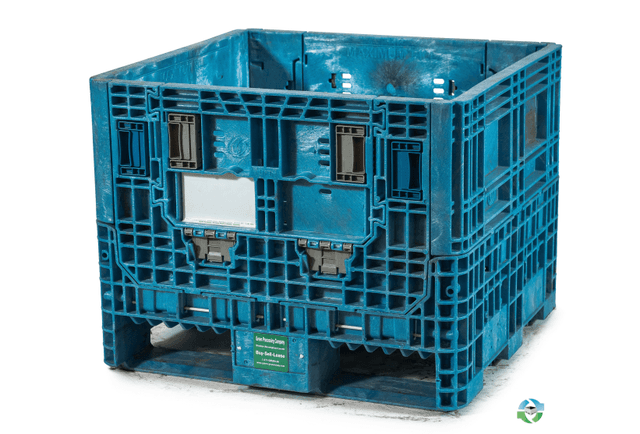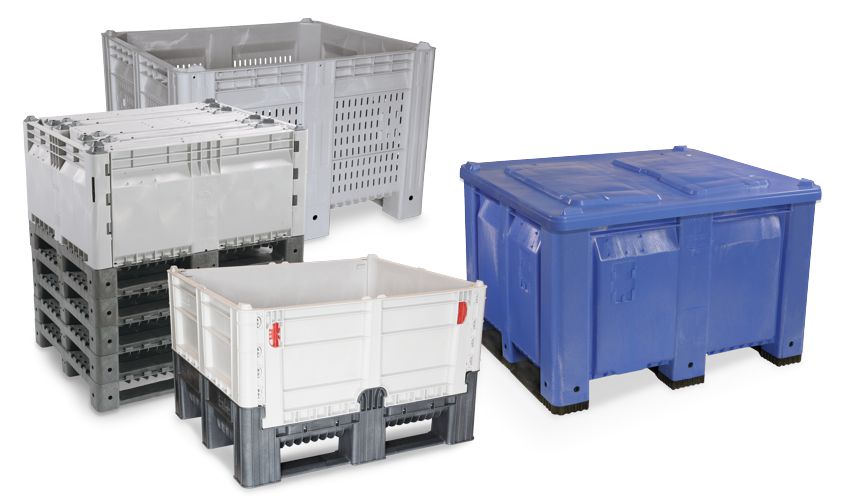How used plastic containers help businesses reduce costs effectively
Why Mass Containers Are Crucial for Lasting and Affordable Transport
Bulk containers play a crucial role in modern logistics. They promote the efficient movement of large amounts of products, consequently optimizing transportation processes. This technique not only reduces costs but additionally reduces ecological impact through lower exhausts and waste generation. As markets look for even more sustainable techniques, the fostering of bulk containers is coming to be increasingly significant. What ramifications does this change hold for future logistics and supply chain administration?

The Advantages of Utilizing Mass Containers in Logistics
Bulk containers transform logistics by improving efficiency and sustainability. These containers permit for the transportation of large quantities of items in a single trip, markedly lowering the variety of journeys called for. This not just simplifies operations however also reduces labor costs connected with handling, packing, and unloading. Additionally, bulk containers are made to maximize room utilization within transportation lorries, guaranteeing that even more items can be delivered at the same time.
The standardization of bulk containers additionally streamlines the logistics process. With uniform measurements, they can be easily stacked and stored, causing improved storage facility monitoring. Bulk containers commonly include sturdy materials that safeguard materials from damages throughout transit, therefore reducing product loss and increasing total integrity. Consequently, organizations can experience boosted supply chain efficiency, inevitably causing enhanced profitability and client satisfaction. This combination of variables makes bulk containers a crucial possession in contemporary logistics.
Environmental Effect: Minimizing Waste and Carbon Footprint
As industries progressively focus on sustainability, the fostering of mass containers has arised as a vital strategy for reducing waste and decreasing carbon impacts. These containers reduce making use of product packaging materials, such as boxes and plastic, thereby significantly reducing total waste generation. By consolidating deliveries, mass containers improve transport performance, permitting more products to be moved per trip. This reduction in trips straight associates with lower greenhouse gas exhausts, adding to a smaller carbon footprint.
Furthermore, bulk containers can often be recycled or reused, even more reducing environmental effect. The toughness of these containers warranties they can stand up to several transport cycles, minimizing the demand for single-use choices. used bulk containers. By simplifying logistics and promoting reliable resource usage, bulk containers not just sustain sustainable methods but likewise motivate industries to straighten with worldwide ecological goals. Inevitably, their implementation mirrors a dedication to eco-friendly stewardship and liable resource administration
Price Savings: Exactly How Bulk Containers Lower Transport Expenses
While lots of firms seek methods to improve their profits, using bulk containers provides a substantial opportunity for decreasing transport expenditures. Mass containers take full advantage of the quantity of goods transported, permitting companies to deliver bigger quantities at once. This efficiency lowers the variety of trips needed, straight decreasing gas prices and lessening labor expenses connected with loading and discharging.
Furthermore, bulk containers typically feature structured styles that enhance room use within transportation lorries. This indicates fewer voids, resulting in much more reliable use of readily available capability. The sturdiness of mass containers can lower the danger of product damage during transportation, guaranteeing and reducing losses that more products show up intact.
Enhancing Supply Chain Efficiency With Mass Storage Solutions
Bulk storage options play a necessary function in boosting supply chain performance by maximizing supply monitoring. By combining goods right into fewer, bigger containers, companies can considerably lower dealing with prices related to constant transfers and processing. This streamlined method allows for much better monitoring and management of inventory, ultimately bring about improved functional efficiency.
Structured Supply Administration
Reliable supply monitoring is necessary for enhancing supply chain procedures, especially when organizations adopt bulk storage solutions. These options allow organizations to maintain higher supply degrees while lessening the regularity of replenishment. By combining materials into mass containers, firms can improve their inventory processes, decreasing the intricacy connected with tracking multiple smaller sized packages. This method helps with exact supply matters and enhances forecasting precision, allowing for more enlightened decision-making. In addition, mass storage services streamline storage facility organization, making it easier to find and accessibility items when required. Consequently, companies can accomplish an extra efficient inventory turn over rate, ultimately improving total supply chain performance and minimizing the likelihood of stockouts or overstock scenarios.

Lowered Handling Prices
The application of bulk storage remedies not just streamlines inventory administration however likewise significantly lowers taking care of costs across the supply chain. By consolidating materials into mass containers, companies decrease the need for frequent handling and transfer in between various storage and transportation systems. This approach minimizes labor prices related to loading, dumping, and relocating smaller packages. In addition, mass storage space minimizes the frequency of shipments, leading to reduced transportation expenses and decreased gas intake. As a result, services can maximize their logistics procedures, permitting for a more reliable allotment of resources. Inevitably, reduced managing prices contribute to improved general supply chain efficiency, promoting an environment that sustains both sustainability and economic practicality.

Adaptability of Mass Containers Across Various Industries
Although many industries have distinctive needs for transportation and storage space, mass containers have actually become a versatile option that meets a variety of demands. These containers, varying from big containers to specialized containers, can suit varied products, consisting of powders, granules, and fluids. In the agricultural market, mass containers help with the transportation of fertilizers and grains, while the food and beverage market uses them for components and completed products. The chemical market depends on bulk containers for securely carrying unsafe products, making certain conformity with safety and security regulations. In addition, building firms benefit from mass containers for delivering aggregates and various other materials. Their adaptability encompasses different modes of transportation, consisting of trains, trucks, and ships, enhancing logistical efficiency. This flexibility not just simplifies operations across various markets yet also advertises sustainability by minimizing packaging waste and maximizing room in transit. Consequently, mass containers play an website important duty in modern-day supply chain management.
Future Fads in Bulk Container Usage and Sustainability
The future of mass container use is significantly formed by cutting-edge materials growth that boosts sustainability. Additionally, automation in logistics guarantees to streamline operations, reducing waste and enhancing efficiency. Accepting round economic climate techniques will additionally reinvent how bulk containers are designed, used, and reused, promoting a much more lasting transport landscape.
Innovative Materials Development
As sectors increasingly prioritize sustainability, innovative products advancement wholesale containers emerges as a substantial consider improving eco-friendly transportation services. Scientists and suppliers are checking out naturally degradable plastics, recycled compounds, and light-weight metals to reduce ecological impact. These materials not only reduce waste yet likewise boost fuel efficiency by reducing the general weight of containers. In addition, innovations in smart materials, which can adjust to differing conditions, enhance the durability and performance of mass containers. The combination of these cutting-edge materials straightens with round economic climate principles, promoting reuse and recycling. As the demand for lasting techniques grows, the growth of such materials will certainly play an important role fit the future of bulk container use in logistics and transportation.
Automation in Logistics
Substantial innovations in automation are positioned to transform logistics and the use of bulk containers, enhancing sustainability in transportation. Automated systems, consisting of drones and autonomous automobiles, are improving the motion of bulk containers, lowering the dependence on conventional fuel-powered transport. These modern technologies maximize routing and packing processes, lessening empty miles and enhancing fuel efficiency. Additionally, automated supply monitoring systems boost tracking and tracking of mass containers, making certain much better resource allowance and lowered waste. The integration of the Internet of Points (IoT) permits real-time data evaluation, allowing proactive decision-making that aligns with sustainability goals. As automation continues to evolve, it is anticipated to drive additionally innovations wholesale container use, ultimately sustaining even more lasting logistics practices and decreasing the ecological effect of transport.
Round Economic Situation Practices
Innovations in automation are establishing the stage for a more integrated approach to round economy methods in the domain of bulk container usage. As markets increasingly accept sustainability, bulk containers are being designed for longevity and reusability. This shift not only reduces waste but additionally improves resource efficiency. Firms are adopting strategies such as closed-loop systems, where made use of containers are accumulated, refurbished, and reintroduced right into the supply chain. In addition, wise technologies track container life cycles, assisting in far better monitoring and lowering ecological influence. The cooperation in between suppliers, logistics service providers, and end-users is important in establishing requirements for sustainable container use. used collapsible containers. Future fads indicate a growing focus on products that are recyclable and naturally degradable, further strengthening the circular economic climate's principles in mass transportation

Often Asked Concerns
What Materials Are Mass Containers Generally Made From?
Mass containers are typically constructed from durable materials such as high-density polyethylene, aluminum, cardboard, and steel. These products offer protection, strength, and versatility, making them appropriate for carrying numerous items in different industries effectively.
Exactly how Do I Choose the Right Size Mass Container?
Picking the appropriate size bulk container entails reviewing the volume of materials to be moved, thinking about taking care of equipment compatibility, and assessing storage room needs. Proper size assurances efficiency in transport and minimizes waste during shipment.
Are Bulk Containers Reusable or Recyclable?
Bulk containers are commonly reusable, designed for multiple journeys, enhancing sustainability. Several can also be recycled, depending upon the products used. Choosing recyclable options additionally minimizes and sustains ecological objectives waste in transportation techniques.
What Safety Laws Relate To Bulk Container Transportation?
Security guidelines for bulk container transportation include compliance with the Division of Transport guidelines, correct labeling of unsafe products, architectural honesty assessments, and adherence to weight limits to assure safe handling and protect against accidents throughout transportation.
Just How Can Companies Change to Utilizing Bulk Containers Properly?
Companies can change to bulk containers by examining existing logistics, training staff on handling, buying appropriate devices, enhancing inventory administration, and collaborating with providers to assure compatibility and efficiency throughout the supply chain.
As industries progressively prioritize sustainability, the adoption of mass containers has actually arised as a vital approach for decreasing waste and reducing carbon impacts. By combining materials right into bulk containers, companies can simplify their supply procedures, lowering the intricacy linked with tracking numerous smaller plans. As markets progressively focus on sustainability, innovative materials development in mass containers arises as a significant factor in improving green transport options. Automated systems, including drones and self-governing cars, are enhancing the motion of bulk containers, lowering the dependence on traditional fuel-powered transport. In addition, automated supply management systems boost tracking and tracking of bulk containers, ensuring much better source allowance and reduced waste.